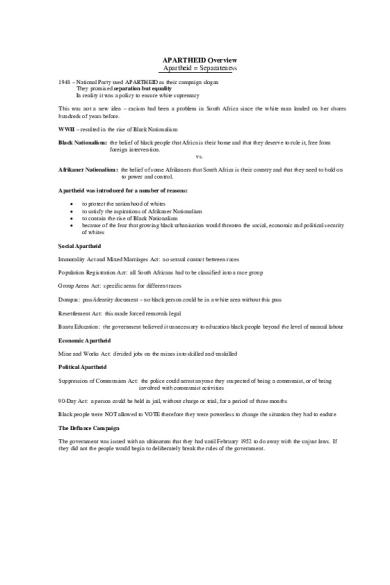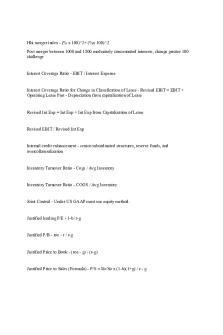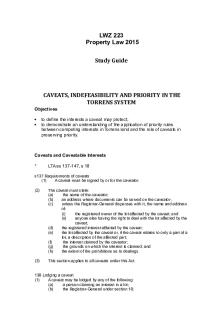Apartheid-Overview - Grade 11 History Study note summaries PDF

| Title | Apartheid-Overview - Grade 11 History Study note summaries |
|---|---|
| Author | Caylin Riley |
| Course | History |
| Institution | Further Education and Training |
| Pages | 2 |
| File Size | 64.4 KB |
| File Type | |
| Total Downloads | 66 |
| Total Views | 871 |
Summary
APARTHEID OverviewApartheid = Separateness1948 – National Party used APARTHEID as their campaign slogan They promised separation but equality In reality it was a policy to ensure white supremacyThis was not a new idea – racism had been a problem in South Africa since the white man landed on her shor...
Description
APARTHEID Overview Apartheid = Separateness 1948 – National Party used APARTHEID as their campaign slogan They promised separation but equality In reality it was a policy to ensure white supremacy This was not a new idea – racism had been a problem in South Africa since the white man landed on her shores hundreds of years before. WWII – resulted in the rise of Black Nationalism Black Nationalism: the belief of black people that Africa is their home and that they deserve to rule it, free from foreign intervention. vs. Afrikaner Nationalism: the belief of some Afrikaners that South Africa is their country and that they need to hold on to power and control. Apartheid was introduced for a number of reasons:
to protect the nationhood of whites to satisfy the aspirations of Afrikaner Nationalism to contain the rise of Black Nationalism because of the fear that growing black urbanisation would threaten the social, economic and political security of whites
Social Apartheid Immorality Act and Mixed Marriages Act: no sexual contact between races Population Registration Act: all South Africans had to be classified into a race group Group Areas Act: specific areas for different races Dompas: pass/identity document – no black person could be in a white area without this pass Resettlement Act: this made forced removals legal Bantu Education: the government believed it unnecessary to education black pe ople beyond the level of manual labour Economic Apartheid Mine and Works Act: divided jobs on the mines into skilled and unskilled Political Apartheid Suppression of Communism Act: the police could arrest anyone they suspected of being a communist, or of being involved with communist activities 90-Day Act: a person could be held in jail, without charge or trial, for a period of three months Black people were NOT allowed to VOTE therefore they were powerless to change the situation they had to endure The Defiance Campaign The government was issued with an ultimatum that they had until February 1952 to do away with the unjust laws. If they did not the people would begin to deliberately break the rules of the government.
The Freedom Charter – based on the American Bill of Rights
non-racialism non-sexism a fair distribution of wealth the right to education and social security government should be ruled by the will of the people
The Armed Struggle Sharpeville Massacre: 21st of March 1960 ANC= Umkhonto we Siswe PAC = Poqo The Rivonia Trials Operation Mayibuye – Plan devised at Lilliesleaf in Rivonia, Johannesburg to overthrow the government Plans were leaked and many top leaders arrested and ultimately sentenced to life imprisonment The Homeland Policy The aim of the policy was to separate the races of South Africa into their own territories by creating 10 homelands Bantu Homeland Constitution Act of 1976 – granted self-government to the homelands Mass Demonstrations in the 70s Black Consciousness: a movement based on feelings of pride in who you are was introduced to South Africa by Steve Biko Steve Biko is murdered – government reports claim that he died as a result of a hunger strike 16 June 1976 – Soweto riots inspired by Black Consciousness and in opposition of Bantu Education and the new law that some school subjects were to be taught in Afrikaans: 600 people were killed and thousand more injured Mass Demonstrations in the 80s Tricameral Parliament Resistance organisations encouraged the people not to vote External Pressure on South Africa Economic: sanctions and boycotts Culturally: artists refused to perform in SA and those SA artists who wanted to develop a career had to leave Sport: 1970 South Africa was expelled from the Olympics and could no longer compete internationally – many athletes left and went to represent other countries. The collapse of Apartheid September 1989 – FW De Klerk becomes new state president February 1990 – Nelson Mandela is released from prison April 1994 – First democratic elections held...
Similar Free PDFs

History Grade 11 Notes
- 8 Pages

Cs note - notes summaries
- 34 Pages

Note 11 - Health Law
- 6 Pages

Note 11 - CFA
- 9 Pages

Chapter 11 review note
- 4 Pages

Notes ch 11 - note
- 10 Pages

History lesson two column note
- 2 Pages

Curs 11 - Note de curs 11
- 14 Pages

American History - Grade: A
- 5 Pages
Popular Institutions
- Tinajero National High School - Annex
- Politeknik Caltex Riau
- Yokohama City University
- SGT University
- University of Al-Qadisiyah
- Divine Word College of Vigan
- Techniek College Rotterdam
- Universidade de Santiago
- Universiti Teknologi MARA Cawangan Johor Kampus Pasir Gudang
- Poltekkes Kemenkes Yogyakarta
- Baguio City National High School
- Colegio san marcos
- preparatoria uno
- Centro de Bachillerato Tecnológico Industrial y de Servicios No. 107
- Dalian Maritime University
- Quang Trung Secondary School
- Colegio Tecnológico en Informática
- Corporación Regional de Educación Superior
- Grupo CEDVA
- Dar Al Uloom University
- Centro de Estudios Preuniversitarios de la Universidad Nacional de Ingeniería
- 上智大学
- Aakash International School, Nuna Majara
- San Felipe Neri Catholic School
- Kang Chiao International School - New Taipei City
- Misamis Occidental National High School
- Institución Educativa Escuela Normal Juan Ladrilleros
- Kolehiyo ng Pantukan
- Batanes State College
- Instituto Continental
- Sekolah Menengah Kejuruan Kesehatan Kaltara (Tarakan)
- Colegio de La Inmaculada Concepcion - Cebu






